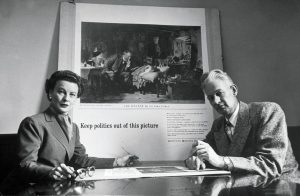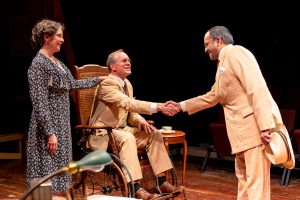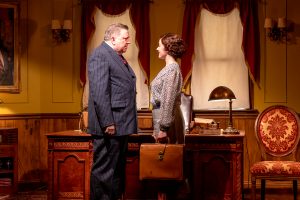During early performances of Campaigns, Inc., director Nick Bowling (NB) took some time with playwright Will Allan (WA) to learn more about his inspirations for writing the play, what has made this process so exciting, and the all too real connections to our world today. Read an edited version of that conversation below or watch the full version here.
On of my favorite things about TimeLine is when you go and see a story about a moment in history you never knew happened. And for me, that was this. — Will Allan, playwright of Campaigns, Inc.
Nick Bowling: You’ve been with the company for over 13 years and I remember the first time you came to me about the idea for Campaigns, Inc. was about seven years ago, right?
Will Allan: Yeah. I actually probably first mentioned Campaigns, Inc. to you eight or nine years ago.
NB: Wow. That’s unbelievable.
WA: When I first came to you with this idea, my thought was, “This is a cool idea for a play.” I had no intention of writing it. I just thought, “Wow, what a cool story. Nick will love this story. He’ll want to hear about this. TimeLine will think this is cool.” And then a few years go by and Ben Thiem, our former Literary Manager said, “Hey. That idea you had, Nick kind of wants you to flesh it out a little bit. Do you have any interest in being a writer and being a playwright and trying to actually put this on paper?” I had no clue really what I was doing. And fortunately, the Collective helped a lot with that. We had a great group of people.
NB: Will, I want to talk about the first time I remember you showing me the article from The New Yorker. Jill Lepore from The New Yorker, “The Lie Factory.” What is it about the article and what basic story were you interested in telling from that article?

WA: I thought, “Wow. So, these people who no one’s ever heard of, ran this campaign against the most famous American author—ran a smear campaign against Upton Sinclair. And I thought these two people who were 31 and 28 in 1934—one of whom is a woman in politics in ‘34—destroyed the most famous and beloved American author of the time using these smear tactics. And I thought you know, one of my favorite things about TimeLine is when you go and see a story about a moment in history you never knew happened. And for me, that was this. I was like, people need to know about Clem Whitaker and Leone Baxter, whether I agree with their politics or not. They are very important people in the history of the United States political landscape.
NB: I remember when you said to me, here she is [Leone Baxter], this woman that you’re sort of find yourself fighting for because she’s a woman against all the men in the room. She’s the one female voice in the room. And so naturally you find yourself kind of rooting for her, but she’s fighting for the guy that you wouldn’t expect her to be fighting for. She’s not fighting for the socialist, the people, the common man’s politician. She’s fighting for the incumbent Republican governor, who in your comedy is really treated as the bad guy in a way. She’s fighting for him. And sometimes she’s fighting for things she doesn’t believe in, but she’s fighting because she’s got a job and she’s doing what she thinks is the right thing to make her company successful, etc.
WA: To say that I have unbelievable respect for Leone Baxter and what she achieved is an understatement. She is the driving force of this play. People will watch this play and they will cheer so hard for Leone Baxter and then get to the end of the play and think, “maybe I shouldn’t have been cheering very hard for Leone Baxter.” You see what they go on and do with the rest of their career and Leone, one could argue, hurt women’s rights for quite a while. And that’s what I think is so fascinating about it. People are very complicated. We live in a day and age right now where we think, “Oh, person’s bad. Person’s good.” That’s just not the case with anybody. And with her, I think even more so because she knew that she was going to have to do some dirty things to get to the top. She wasn’t necessarily going to intentionally hurt anyone. But she knew she was going to have to take risks. She was going to have to do things that she maybe doesn’t necessarily want to do to rise in the political ranks. Especially as a woman in politics in 1934. And I like to talk about this idea that she’s actually—at 28 years old in 1934— she is in a lot of ways the second most powerful woman in politics in the United States of America behind Eleanor Roosevelt.
NB: So, here you have Campaigns, Inc. which, by the way, is the name of their actual company. It sort of sounds like that’s our funny musical theatre title of the play with an exclamation point at the end. But that’s the name of their actual company. You have Campaigns, Inc. in the middle of your play. What do you decide to put around it or how do you make those decisions?

WA: What I really wanted to create was this this world of our two heroes. We’ll call them heroes because they are the ones striving to achieve something great here. And I wanted to fill in that world with the craziness of this Sinclair election. I mean, this was one of the most controversial but important elections in certainly California history, but really in U.S. history. And there were so many star-studded people involved [Charlie Chaplin, Ty Cobb, Helen Wills Moody, The Roosevelts]. It just ends up being this whirlwind of a who’s who of America in 1934. And, for me, that was what was going to make this play so fun. [Its] something I think our cast does brilliantly, is fill in all of the space around Campaigns, Inc. with just, in some cases, absurdity, in some cases heartbreak, in some cases passion. It’s just so exciting to watch them have to deal with that and in a similar way to how your main characters. would have to deal with it in the 1930s style screwball comedy, which was one of the main inspirations for the style of the play. [Its] a really fascinating type of film because you have wacky characters, you have heightened scenarios, but ultimately you have extremely relatable, beautiful moments. I just started listening to sort of the music of that dialogue and I fell in love with how these characters talk to each other. They all think so fast, but you believe all of it because those actors are brilliant at accessing those emotions and those quick turns in how they’re feeling about things. That’s what made this ultimately so fun to write and so fun to explore once we got in the room.
NB: I remember one day in rehearsal, they were all memorized and they were kind of ready to go to the races and just go fast. And in a way, at the end of the run, I was like, well, “It was fast.” (Will laughs) And I remember both of us were like, “Okay, there were good things there. But there are some challenges, too.” This is comedy of a heightened nature. But for me, at least, and I think for you, too, Will, it was always important that it be based in kind of reality. The reality in this play is who’s going to win and who’s going to lose an election. And while that may be fodder for comedy, it’s also very important stuff. If Upton Sinclair had actually won this election, which I guess I’m giving something away by saying that, but will you just talk about the power, the fear of Upton Sinclair winning this election or what might have happened in the country had he won it?
WA: Yeah, that was also one of my main inspirations for wanting to write this play, was being a huge fan of Upton Sinclair, learning, first off, that he was ever a politician, which I think most people don’t know, and that he was stamped with that dreaded word of “socialism.” Which Leone Baxter and Clem Whitaker used and weaponized in a way that it had really never been done before. Creating every form of the central mass media smear campaigning that we still see today. You know, the landscape of America might have dramatically changed if Upton Sinclair becomes governor of California. He had an extremely progressive agenda, an agenda that I respect a lot of. He also had some things that were so far out there. I think, well, would it have been better if Upton Sinclair had won? Or would California have just completely dissolved? And I think that’s part of the heart of this play, is who’s fighting for the people? Is anyone actually fighting for the people?

We have a lot of people who come to see this play who laugh a bit, but also say, “Look, it was hard for me to laugh at this play because I’m seeing so much of the vitriol and the sneakiness and the manipulation that I’m seeing in these elections right now.” And I think that is something we’ve done a really great job of capturing in this production. Yes, it’s funny, but it’s also only funny to a point. And, you know, I’m very opinionated about these things. I leave nobody unscathed. It’s that whole aspect of this play that makes it so fascinating. You have Sinclair, who claims to be fighting for the people and seems to be fighting for the people. You have Merriam, who claims to be fighting for the people but probably isn’t. You have Campaigns, Inc., who knows that Merriam is probably not really fighting for the people, but they need to use this opportunity to create their careers and they need to break through barriers. And that’s what makes it such an intricate play. It’s very exciting to see people coming out of that theater with joy, but also coming out of the theater in some cases infuriated with the state of modern politics just based on this story from a hundred years ago. It’s fast, it’s furious, it’s funny, and it’s infuriating.
NB: I’ve been thinking a lot lately, Will, that, you know, this play is set during the Depression, which is the one of the hard things, too but that sort of grounds us in some ways. And throughout your play, a couple of characters every once in a while remind us people are literally starving right now. And yet the ‘30s, for the art that came out of the ‘30s, while there is a lot of art that captures that darkness, much of the art is really capturing the brightness and the light. Because people needed a place to go, to feel good and to laugh and to, you know, to watch Fred and Ginger dance together and to hear a song or whatever it may end up being. And it struck me that that same need might very well be in America right now, that same connection. Although we’re not in a depression, we are in our own kind of depression in a way as a country, struggling through the time period that we’re in. And in a way, your play is a salve for people that are coming here because they want some way to look at that. They don’t want to just turn their head blindly to it, but they want to look at it and try to laugh and try to think beyond the problems of their day to day and even, you know, kind of watch other people’s follies in a way and realize how close those follies are to our own of today. And I think you do that so successfully in Campaigns, Inc. without being on the nose, somehow making it clear that this world has so much to do with the world that we are in almost 100 years later.

WA: I think one of the things that’s so fascinating about this play is that I make no references to 2022 politics whatsoever. And every single person coming out of that theater says, “Wow. This play might as well be about today.” And that is wild considering it takes place 88 years before it today.
It is like escaping to a whole other time period. It really is. When that play starts, it does not feel like you’re in 2022. It feels like you’re in 1934. It is magical. It is absolutely magical, and I’m not crediting myself with any of that. I assure you it’s these performances and the style and this unbelievable story and how it all comes together in a night of theater that I think is bringing so many people joy when they desperately need to feel some joy. Sharing this with people in the theater again has been the most rewarding part of this entire process.
Campaigns, Inc. runs through September 25, 2022 at TimeLine theatre. Learn more and get your tickets now.
